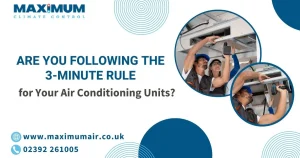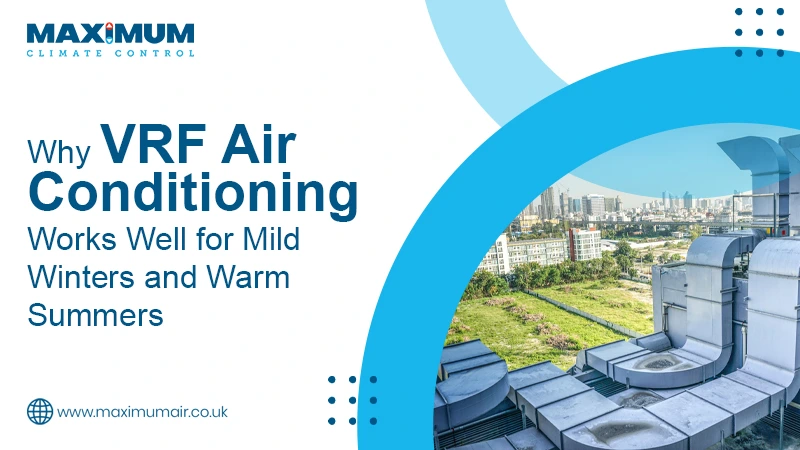Are You Following the 3-Minute Rule for Your Air Conditioning Units?
September 16 2025by Maximum Climate Control

Air conditioning units are prone to a variety of issues. While improper maintenance and extreme weather pose a threat, many are unaware that simple practices, such as quickly turning off air conditioners, are the most damaging. So, if, like many, you blame improper air conditioning unit installation for cooling issues, it’s time you realised there could be a fault at the user’s end.
Let’s start with the 3-minute rule. It’s a guideline that not only reduces the pressure on the compressor but also helps save money on energy bills. Continue reading to find out everything there is to know about the 3-minute rule.
What is the 3-Minute Rule of Air Conditioning in London and Elsewhere?
The rules about air conditioning units are no longer limited to installation but extend to usage. Adherence to the 3-minute rule ensures a long-lasting system that keeps it in top condition.
The 3-minute rule states that one must wait for 3 minutes before turning on the air conditioning again. The reason? It balances the system’s pressure and safeguards the compressor from damage. The pause is necessary for the condensate and refrigerant to start fresh.
Believe it or not, air conditioners demand time for the cool or warm air to distribute throughout one’s home. When domestic users frequently turn them on/off, they result in short cycling. This puts pressure on units and leads to premature wear and tear.
While system stabilisation and short cycles are considered the primary reasons for complying with the 3-minute rule, comfort plays a part, too. The waiting time is short enough for one to acclimatise and experience a pleasant indoor temperature.
The Mechanics Behind the 3-Minute Rule
HVAC professionals often recommend users follow the 3-minute rule during air conditioning installation services. Ever wondered how it works?
- Initial startup: As you turn on your air conditioning unit, it follows an initial startup process, wherein the various components reach their optimal speeds. It includes fans and compressors, among others, to deliver conditioned air.
- Airflow distribution: The cool air from your air conditioning unit requires time to fill the room and its corners. Uniform circulation is gradual.
- Thermostat functionality: Even the thermostat demands a couple of minutes to measure the indoor air temperature. The three minutes of pause, post modifications, cause the thermostat to respond accurately without you finding false readings.
Misconceptions Around the 3-Minute Rule
Even though HVAC experts educate domestic users on the 3-minute rule and the practices expected on their end, people seem to hold a few misconceptions. Listed are the top three you will relate to the most:
Myth #1: It’s only advice
While many users argue that it’s only a suggestion from HVAC experts and not a mandatory practice, in reality, it’s not so. Following this rigorously cuts the risk of damage and improves the unit’s efficiency.
Myth #2: It holds true only for certain units
A false belief among many users is that the three-minute rule applies only to older models. However, the benefits flow to newer models as well, where the operating dynamics are similar.
Myth #3: Adjustments can be made anytime
Comfort and convenience often compel users to alter settings frequently. Practising without a pause results in inefficient operation, and the outcome is suffering in terms of high energy bills.
Invest in Smart Thermostats for Built-In Delays
For many users, getting accustomed to the new habit of maintaining 3-minute pauses may be challenging. HVAC experts recommend smart thermostats to them for the inherent delay settings. It helps avoid the common mistakes by:
- Holding up the AC restart for 3 minutes
- Adjusts the cooling depending on the outdoor temperature and the occupants
- Sends alerts when air conditioning in London or elsewhere requires prompt upkeep
Exceptions to the 3-Minute Rule
The 3-minute rule is mandatory to prolong the life of air conditioning units. However, at times, it may still be unnecessary. Take, for instance, the following two cases:
- Your air conditioner features a new compressor
- Yours is an air conditioner combined with inverter tech, supporting flexible restart times
Avoid Expensive Repairs by Adhering to the 3-Minute Rule
The secret to a long-lasting air conditioner is the 3-minute rule. Not only does it safeguard the compressor and other components, but it also cuts down on energy use. Enjoy a more efficient and reliable cooling system by changing your practice. Home is where it’s the norm to benefit the most from comfort and happiness. In short, the moment you install air conditioning units at your residence, adopt the 3-minute rule and avoid issues, such as refrigerant leaks and higher energy use.
Share this article
If you’re looking for advice or a quote for a new HVAC system or maintenance, get in touch with our expert!
Speak to an expert Explore Our Product RangeFor further reading
January 28 2026By Maximum Climate Control
Why VRF Air Conditioning Works Well for Mild Winters and Warm Summers
While the South of England does not often face extreme weather, its buildings still require dependable heating and cooling – both of which need to stand up to quick weather changes. Winters are generally mild, while summers are getting […]
January 20 2026By Maximum Climate Control
How Commercial AC Service Supports an Efficient and Comfortable Business Environment
A reliable cooling system is important for every commercial property, whether you manage an office, retail space, restaurant, warehouse, or industrial unit. With rising temperatures and increasing indoor air quality demands, businesses rely heavily on their AC systems to maintain […]




